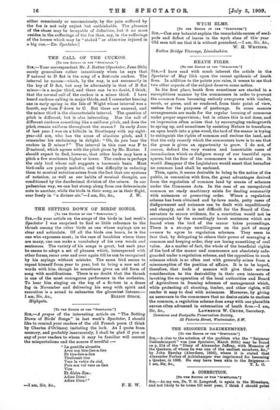HEATH FIRES.
[To THE EDITOR Or THE "SrEeTATOR."] SIR,—I have read with much interest the article in the Spectator of May 15th upon the recent epidemic of heath fires. In addition to the points you raise, it seems to me that two other aspects of the subject deserve some notice.
In the first place, heath fires sometimes are started in a surreptitious manner by the commoners in order to prevent the common from becoming entirely overgrown with timber, scrub, or gorse, and so rendered, from their point of view, useless for the purposes of pasturage. In some manors arrangements are made for the regular burning of commons under proper supervision ; but in others this is not done, and an impression often arises that by encouraging undergrowth to spring up, and sometimes by assisting Nature to transform an open heath into a pine-wood, the lord of the manor is trying to extinguish the rights of common and enclose the land, and that the only remedy which the commoners have is to see that the grass is given an opportunity to grow. I do not, of course, defend the very wanton and lamentable cases of incendiarism which so disfigure many of our beautiful open spaces, but the fear of the commoners is a natural one. It would disappear if the Legislature would enact that hereafter no common land shall be enclosed.
Then, again, it seems desirable to bring to the notice of the public, in connexion with fires, the great advantages derived from the regulation of common land by means of schemes under the Commons Acts. In the case of an unregulated common no ready machinery exists for dealing summarily with nuisances or preserving order. Where a regulation scheme has been obtained and by-laws made, petty cases of disfigurement and nuisance can be dealt with expeditiously and cheaply, and it is not difficult for the Board of Con- servators to secure evidence, for a conviction would not be accompanied by the exceedingly harsh sentences which are feared when the lord of the manor takes proceedings. There is a strange unwillingness on the part of many owners to agree to regulation schemes. They seem to fear that, by delegating to others their power of managing a common and keeping order, they are losing something of real value. As a matter of fact, the whole of the beneficial rights of the lord of the manor and commoners are absolutely safe- guarded under a regulation scheme, and the opposition to such schemes which is so often met with generally arises from a misconception of the position of affairs. It is to be Loped, therefore, that lords of manors will give their serious consideration to the desirability in their own interests of invoking the co-operation of the local authorities and Board of Agriculture in framing schemes of management which, while protecting all shooting, timber, and other rights, will
render it easy to deal with nuisances. Moreover, by giving an assurance to the commoners that no desire exists to enclose the common, a regulation scheme does away with one plausible excuse often advanced in extenuation of heath fires.—I am, Sir, &c., LAWRENCE W. CHIIEB, Secretary.
Commons and Footpaths Preservation Society,
25 Victoria Street, Westminster, S.W.














































 Previous page
Previous page